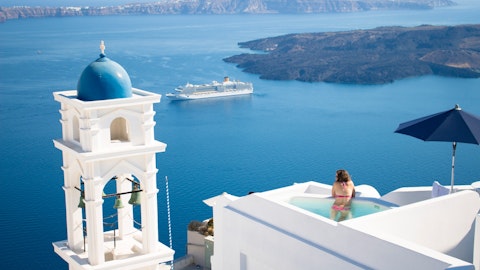In this article, we are going to discuss the top 20 alcohol drinking countries in the world. You can skip our detailed analysis of the origin of alcohol and its religious importance, the global alcohol industry and the market leader, a new entrant in the alcohol industry, and the global shifts in the global alcohol market, and go directly to Top 5 Alcohol Drinking Countries in the World.
The true origin of alcohol is lost in the mists of history but the first signs of it show up around 7000 B.C., when a fermented drink was produced from honey and wild yeasts in ancient China. Alcohol is considered to have driven a significant portion of early societal development. In 1877, an archaeologist named James Death went so far as to suggest that the invention of beer even preceded the invention of bread. That might imply that the reason mankind ever settled down into an agricultural lifestyle was to produce enough grain for beer. In fact, the oldest known recipe in the world is not for food, but how to make beer.
The Religious Importance of Alcohol:
Alcohol has been an important part of human rituals and religions for millennia. While some religions have held alcohol in high esteem as a blessing of the divine, others have outright forbidden any association with it.
However, the religion that drinks the most alcohol is the Japanese Shinto religion, which reveres Sake as the most sacred of drinks – the liquor of the gods.
The Global Alcohol Industry:
In 2019, the global alcohol consumption, measured in liters of pure alcohol per person of 15 years of age or older, was 5.5 liters, which is a 4.7% relative decrease from 5.7 liters in 2010.
According to Allied Market Research, the global alcoholic beverages market size was valued at $1.62 trillion in 2021, and the market is projected to reach $2 trillion by 2031, with a CAGR of 2.2% in the forecast period.
The Belgium-based Anheuser-Busch InBev SA/NV (NYSE:BUD) is the largest alcoholic beverage company in the world, with the company even boasting a 31.3% share of the entire global beer production. Anheuser-Busch InBev SA/NV (NYSE:BUD) reported a profit of around $6 billion in 2022. However, the company has had a shaky few months this year due to the recent controversy surrounding its best-selling beer brand Bud Light. The resulting backlash caused the stock price of the company to collapse from $65.9 on May 4th, to $53.4 on May 31st, a decrease of almost 19% in less than a month.
However, Deutsche Bank has now upgraded Anheuser-Busch InBev SA/NV (NYSE:BUD) stocks from hold to buy, saying that the worst of the boycott is over, even though Bud Light has lost its crown as the Top-Selling Beer in America.
New Entrant in the Alcohol Industry:
In January 2022, Monster Beverage Corporation (NASDAQ:MNST) paid $330 million in cash to acquire CANarchy, a company that owns several breweries including Oskar Blues and Cigar City Brewing, with the intention of diversifying into the alcoholic beverages market.
The start of this year has seen Monster Beverage Corporation (NASDAQ:MNST) roll out its first boozy product – The Beast Unleashed, made using ‘malt alcohol’ and weighing in at 6% ABV. Rodney Sacks, the CEO of Monster Beverage Corporation (NASDAQ:MNST), has stated that the new drink, described as a ‘hard seltzer’, would be available all over the U.S. by the end of the year.
Recent Shifts in the Global Alcohol Market:
From Japan to the United States, global drinking habits have shifted dramatically in recent years. While it may look like the alcohol industry is set to achieve a multi-trillion dollar mark in the coming decades, recent changes in consumer behavior suggest that the market, as we know it today, may be in danger of running dry.
As we mentioned in our article – Gen Z’s 25 Favorite Brands of 2023 – a growing share of the health-conscious Gen Zers are turning away from alcohol. Gen Z drink 20% less per capita than millennials – who, in turn, drink less than Baby Boomers or Gen Xers did at the same age. This has led to the rise of companies like the Athletic Brewing Co., with the non-alcoholic beer maker now becoming one of the Largest Craft Breweries in the US by Volume.
This has also caught the attention of Anheuser-Busch InBev SA/NV (NYSE:BUD) and the industry giant is now investing $34 million in upgrading some of its Belgian breweries, which will help expand its non-alcoholic beer portfolio. The company has also set itself an ambitious target of having low-and-no alcohol beers account for 20% of its overall sales by 2025.
According to Global Market Insights, the global non-alcoholic beer market was valued at $22 billion in 2022, and is expected to reach $40 billion by 2032, with a CAGR of 5.5% in the forecast period.
With that said, here are the Countries with the Highest Alcohol Consumption in the World.

Pixabay/Public Domain
Methodology:
To collect information for this article, we have referred to The Global Health Observatory of the World Health Organization, looking for Countries that Consume the Most Alcohol. We found reliable data on the per capita consumption of pure alcohol in every country for people aged 15 or over in 2019, and then ranked the top 20 accordingly.
One thing to keep in mind is that just because the people in these countries generally consume high levels of alcohol, it doesn’t necessarily mean that they’re drunkards. Alcohol is simply an essential part of many cultures around the world and alcoholic beverages play an important role in important events and celebrations, since they can be associated with many festivals and rituals.
20. Spain
Per Capita Consumption of Alcohol: 10.91 liters
Alcohol has always been an important part of Spanish culture and the Spanish red wine and sangria are especially admired all over the world. Beer is the Spaniards’ favorite tipple, consumed by over 50% of the population.
Mahou San Miguel, the beer market leader in Spain with a production share of 34% signed an agreement with Anheuser-Busch InBev SA/NV (NYSE:BUD) in 2019, to produce and distribute a wide range of the company’s brands in the country. This was the first time that industry behemoth’s brands were being produced in Spain.
19. Slovenia
Per Capita Consumption of Alcohol: 10.98 liters
While Slovenians love beer and wine, there’s really only one national drink: Schnapps. Called Zganje in the local language, making this liquor is also a national pastime, and although you can find factory-made bottles of Schnapps in liquor stores and supermarkets, it’s the locally made Zganje brewed in someone’s garage that’s usually the best.
18. Andorra
Per Capita Consumption of Alcohol: 11.05
Andorra has one of the lowest taxes on food and alcohol. The tax on food is just 1%, while the alcohol tax is 4.5%. In neighboring Spain, most taxes start from 20%, and that’s why many people come from France and Spain to Andorra just to stock their fridges by buying fish, meat, groceries and alcohol.
17. Estonia
Per Capita Consumption of Alcohol: 11.26
Prices of goods and services increased rapidly in Estonia last year while the rise in alcohol prices was significantly less. The prices of beer and grape wine rose slightly but the price of hard alcohol remained at the 2021 level or cheaper. The incomes of the Estonian people continued to grow in 2022 and so alcohol became even more accessible.
16. France
Per Capita Consumption of Alcohol: 11.3
Recognized all over the world for its savoir-faire regarding food and drink, France has a long history of alcohol production and consumption. Social phenomena such as the ‘aperitif’ can begin to explain how France earned its place as one of the Countries with the Highest Alcohol Consumption in Europe.
The Moët Hennessy champagne brands of LVMH boasted a revenue of around $2.5 billion in 2021 and employed a total of 2,485 people.
15. Moldova
Per Capita Consumption of Alcohol: 11.36
The Republic of Moldova is one of the Top Countries that Consume the Most Alcohol in the world. The wine culture is very strong in the Eastern European country and the wine industry employs almost 10% of the national workforce, with the income generated from viticulture forming 15% of the annual national budget.
14. Laos
Per Capita Consumption of Alcohol: 11.52 liters
Laos has many ethnic groups and each has its own traditions and culture, but alcohol plays an important role throughout its society. Many people in the country spend six months a year cultivating crops such as rice and sweetcorn, with some of the crop used to make alcohol. Lao-Lao is a type of clear rice whiskey made in the country. Laos is the Top Alcohol Drinking Country in Asia.
13. Luxembourg
Per Capita Consumption of Alcohol: 11.53 liters
Luxembourg consumes 11.53 liters of pure alcohol per capita, more than twice the world average and equivalent to roughly 500 bottles of beer. Wine is the most popular alcoholic beverage in the country, followed by beer and spirits.
12. Poland
Per Capita Consumption of Alcohol: 11.63 liters
Poland is the largest market for vodka in the EU, representing over 35% sales in the region. After years of decline, the market for vodka has been steadily growing in the country since 2017. With over 20% of the vodka market share in Poland, the Żubrówka brand remains the market leader. Poland is also one of the Countries that Produce the Most Alcohol.
11. Ireland
Per Capita Consumption of Alcohol: 11.7 liters
The Guinness Irish stout, owned by Diageo plc (NYSE:DEO) is one of the Most Consumed Beer Brands in the World. Diageo plc (NYSE:DEO) also announced plans last year to invest $225 million in a carbon-neutral brewery in Ireland, which aims to be powered with 100% renewable energy. Diageo plc (NYSE:DEO) was formed in 1997 by the merger of Guinness and Grand Metropolitan companies.
10. Lithuania
Per Capita Consumption of Alcohol: 11.79 liters
Lithuanians mostly prefer to drink beer, which makes 44% of the total consumed alcohol in the country, while wine accounts for 15% of the total alcoholic consumption. Lithuania is among the Top Countries that Drink the Most Alcohol.
9. Bulgaria
Per Capita Consumption of Alcohol: 11.92 liters
Bulgaria has one of the highest levels of alcohol consumption, roughly equivalent to 2.6 bottles of wine or 4.9 liters of beer per week per person aged 15 or older. Based on the current consumption patterns in the country, OECD simulations estimate that diseases and injuries caused by drinking lead to treatment costs equivalent to 1.8% of the national health expenditure.
8. Austria
Per Capita Consumption of Alcohol: 11.97 liters
Unlike in some European countries, purchasing alcohol in Austria is regulated at the local level. Essentially, there are two different age requirements – either 16 or 18 years – and these depend on the region and the percentage of alcohol content. Flavored with the young red cones of the Arolla Stone Pine, Zirbenz is a popular liqueur in the Land of Mozart.
7. Seychelles
Per Capita Consumption of Alcohol: 11.99 liters
Alcohol has an important social role in Seychelles and also plays a significant part in the country’s economy, generating substantial employment and tax revenue. Seychelles was among the Top Alcohol Drinking Countries in Africa in 2022 and the government devised a National Alcohol Policy to encourage responsible drinking in the island nation.
6. Uganda
Per Capita Consumption of Alcohol: 12.21 liters
Uganda is the Top Drinking Country in Africa and excessive consumption of alcohol has been identified as one of the major causes of poverty in the East African country, as it leads to declined productivity, increased expenditure and loss of assets, impaired judgment and vulnerability to disease, thereby being a driver and maintainer of chronic poverty.
Click to continue reading and see the Top 5 Alcohol Drinking Countries in the World.
Suggested Articles:
- 12 Countries that Produce the Best Wine
- Best Craft Beer Brands in Each U.S. State
- 20 Best Imported Beers in USA in 2023
Disclaimer: None. Top 20 Alcohol Drinking Countries in the World is originally published on Insider Monkey.





